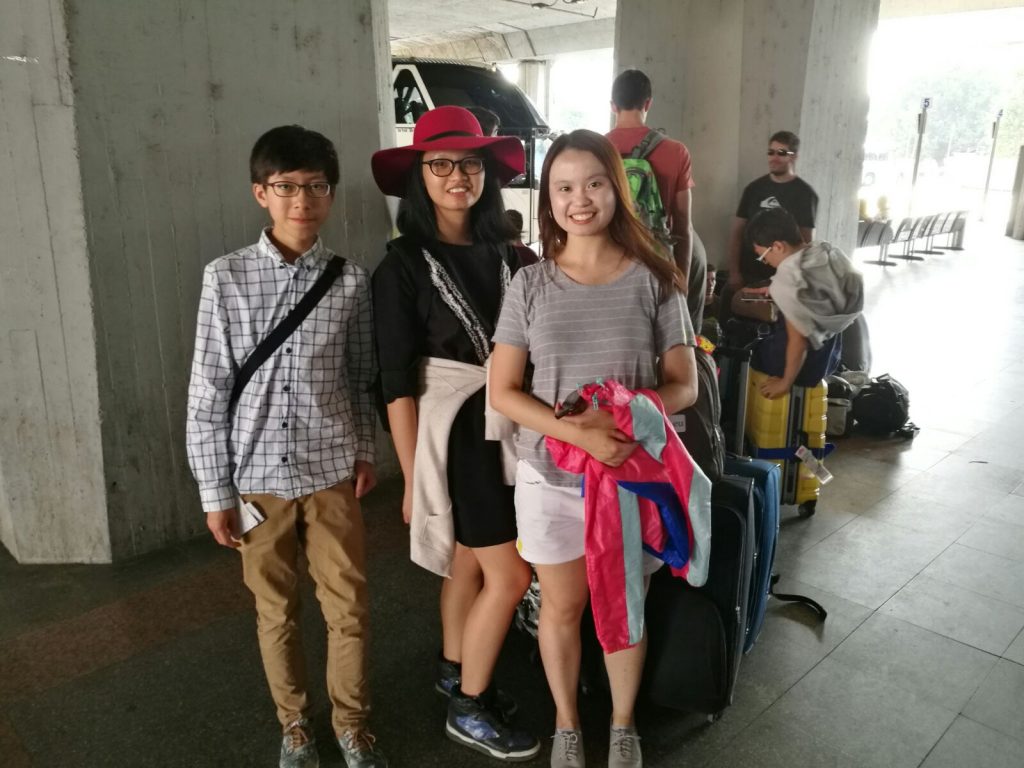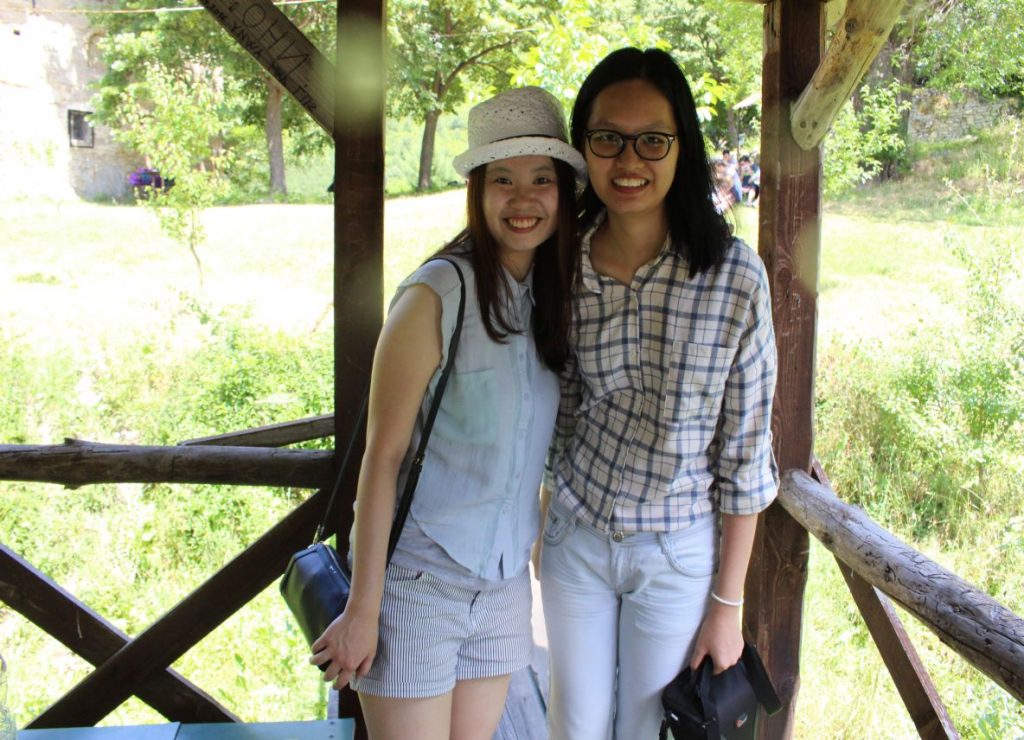
Photo credits: Marcin Szcześniak
Women in technology? – some might ask. Strong and courageous young women, we would add. For some a challenge while for others a major risk. Computer science has always been considered to be a man’s profession. However, reality has started to show a different side. Even though many of women still believe that their gender is holding them back from doing what they love, the girls that participated at Mladiinfo’s project – myouth do not agree!
We met the smiling and charming Mandy and Yi Fang at our mYouth project in Skopje, Macedonia focused on mobile app development and m-Learning. The two were some of the few female participants in the project. Mandy is pursuing her Master of Science (MSc) at the Hong Kong University of Science and Technology, majoring in Information Technology. Yi Fang is a Bachelor student at Singapore Management University and is studying Information Systems.
MladiInfo: Where did the passion for programming come from and when did you start programming?
Mandy: The passion for solving issues and problems is much more important than the passion for programming. Information Technology can be an integration of Science and Technology. It is fun, interesting and challenging. I started programming when I entered university. Programming or Information Technology is not a main subject in most high schools in Hong Kong. Most local students officially obtain programming knowledge in University.
Yi Fang: Initially I didn’t have any passion for programming, but as I continued learning, I saw the possibility of harnessing business with technology to design solutions for problems. Thanks to my mentor, Mr. Tan Hu Hsien, and Ms. Dora Chua from Singapore Polytechnic for encouraging me to go outside the school walls to explore more about technology, I managed to understand more about programming. Hackathons, tech events, conferences, and networking sessions were stepping stones for me to develop an interest in programming. Through these events, I met amazing people and experts in their own fields, including technical development, marketing, UI/UX design, analytics and other areas. Truly impressed, I wanted to become like them one day – to excel in something that resonates with me.
MladiInfo: What was the first code that you learned? Was it “Hello World”?
Mandy: The first Language I learn was C++. I remember it was a compulsory course in the first year of my college. Yes, you are right. “Hello World” was the first program.
Yi Fang: “Hello World” was the first code I learnt to write in Java and run on the laptop. Subsequently when I learned other languages, writing “Hello World” was the most basic.
MladiInfo: Is it difficult to find a job as a programmer? To be more precise, as a “woman programmer”?
Mandy: In Hong Kong, programmers are in short supply, as well as “woman programmers”. As the understanding of I.T. among citizens improves, it is believed there will be an improvement in this respect.
Yi Fang: In Singapore, it isn’t difficult to find a job as a programmer. In fact, there is an increasing demand for programmers from start-ups to enterprises spanning across all industries. Whether it is a female programmer or a male programmer, gender does not place a significant role in securing a job. I’ve seen companies having different compositions of male and female programmers. Although there are a relatively high proportion of male programmers now, I think the number of women programmers is on the rise. Programming is not only a commonly seen skill-set but also a good-to-have, industry-relevant skill.
MladiInfo: What do you think about women programmers and how people see the women programmers in the countries you come from?
Mandy: They are tough, like a fire fighter. They look smart, strong and rational. Information Technology is not a main industry. It is better to say that finance, accounting, business still play an important role in Hong Kong and have especially great impacts from China. People in growing numbers understand the significance of I.T. as it is believed to be the next generation in Hong Kong.
Yi Fang: I always have the impression that women programmers are determined, diligent and competent at their work. In terms of coding capability, I do not see that women are weaker than men or vice versa. It’s just a matter of fact how quickly they learn a new technology and put it into action. After all, the ability to code can be picked up and honed if one has determination and puts in at least 10 000 hours of practice. Without determination and diligence, it is impossible to succeed.

Women programmers earn respect through their competence at work. Each of them has her own expertise in different programming languages, regardless of hardware or software. As such, I have a lot of respect for them, because I know that they have walked a long way down the road to sharpen their skills. In Singapore, people welcome and respect women programmers. They understand the nature of the job as a challenging one, because it requires long hours of logical thinking. Not many women are ready and willing to become a programmer. As such, women programmers are valued and well-respected in the society.
During hackathons, tech events or conferences, it is inevitable that people will get to meet and interact with women programmers. There are special tech meet-up groups for women programmers to learn coding or the latest technologies. One example is the Geek Girls Meetup.
MladiInfo: You were participating in the mYouth seminar in Macedonia, can you share some of your experiences?
Mandy: The courses and activities were wonderful and well-organized. It was a valuable experience to meet participants from different countries, especially since we were talking about aspects of Information Technology. Hiking and Jogging in Macedonia were definitely unforgettable memories. The most vital thing in Macedonia was meeting friends and then sharing my ideas.
Yi Fang: The MYouth seminar was my first international seminar in Europe. I had an enjoyable and enriching experience through interacting with people where I could sense the passion they had for the product they were building and offer my feedback about their products. I have to say that the MYouth seminar was well-organized. The seminar consisting of Advanced Android Training and Business Modelling Training provided me with insights to explore new ideas for future implementation. The Advanced Android Training introduced me to recent technologies such as Firebase Realtime Database, Authentication, Storage and Push Notification. On the other hand, the Business Modelling Training taught me various revenue models, marketing strategies for pre-launch and post-launch. The trainers had knowledge about the topics being taught and were able to offer practical business development advice and technical advice from their own experience.
MladiInfo: What was your idea for an application?
Mandy: My application is called “Smart Eyes Protector”, it is an Android application that aims at preventing users from several common eye diseases such as short-sightedness, strabismus and so on. Excessive use of digital devices has aroused public concern in our society. Especially the numerous and attractive games inside smartphones make it easy for children to become addicted to such devices, and the number of people with advanced stage of myopia has continuously increased over the past decades. In addition to myopia, there are even more serious diseases caused by improper use of smartphones, for example spinal problems and macular degeneration.
Smartphones occupy a superior position among young people. Experts have realized that some social problems arise when children spend less time with their parents in family and outdoor activities, meanwhile 40%-50% percent of adolescents could have myopia by 2033 as a result of smartphoned and lifestyles in front of a screen. It has been an alert to create some tools to avert the problem. The most feasible way is to install an application on smartphones. By utilizing the front camera and multiprocessing ability, we can monitor the user in real time and do not affect the operation of the smartphones.
Yi Fang: My idea is to build an educational mobile application, Quest. It is a project developed together with my team (Htet Htet Aung, Song Tianqi, Kong Yuxue and Ren Menghao). Quest aims at building a nationwide community of tertiary students on a high quality educational platform that responds to constantly evolving needs of the tertiary students by exchanging knowledge in Singapore. Through this platform, Quest hopes to develop the interest of tertiary students in their courses by making it easy for them to seek academic resources or advice from peers who are in the same specialization. The help ranging from assignment and study tips to career tips will fuel their interest in their specialization.
MladiInfo: How can this application help society?
Mandy: The application should be helping the digital generation. Students or even adults spend more and more time on their smart phone. They don’t recognize that improper usage of smart phone brings serious impacts to their life. As a user of mobile phones, taking away or stopping using is not a good idea. So my question is “Why don’t we use an application to prevent the side effects of mobile phones?”
Yi Fang: Our application encourages peer-to-peer learning and peer-to-peer mentoring in society. Furthermore, it widens the social network of tertiary students by connecting them to students studying in the same specialization from different tertiary institutions. The bigger the social network, the more accessible it will be for students to exchange academic resources and advice beyond their circle of friends.
Interview by: Sanja Cvetkovikj and Berkan Asanovski
Edited by: Ivana Petriskova


